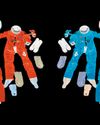
In April 10, 2019, scientists produced the first image of a black hole, a century after Einstein’s work had implied the existence of such extraordinary objects. You didn’t need to know a lot of physics to be impressed by the image. The black hole it showed was some 55 million light-years distant from us and had a diameter about 3 million times that of the Earth. Like the famous “Earthrise” photograph taken by William Anders during the 1968 Apollo 8 mission, showing the Earth rising over the surface of the moon, the image of the black hole calls on us to assess our place in the universe, but the two photos pull us in different directions. “Earthrise” allowed us to see our planet as a sphere in space and emphatically displays the importance of making that sphere sustainable. Seeing the black hole, in contrast, forces us to grapple with the strangeness of the universe of which we are such a tiny part.
In the same week that we marvelled at the black hole, a private Israeli lunar probe, Beresheet, experienced a technical glitch and crashed onto the surface of the Moon. Its venture into space, like Elon Musk’s SpaceX venture that plans to colonise Mars, raises ethical issues about humans’ exploration and use of the universe beyond their own planet. Are the solar system and the entire universe beyond now open for everyone to colonise, for whatever purpose they wish, if they have the means to do so?
This story is from the June 17-23 2023 edition of New Zealand Listener.
Start your 7-day Magzter GOLD free trial to access thousands of curated premium stories, and 9,000+ magazines and newspapers.
Already a subscriber ? Sign In
This story is from the June 17-23 2023 edition of New Zealand Listener.
Start your 7-day Magzter GOLD free trial to access thousands of curated premium stories, and 9,000+ magazines and newspapers.
Already a subscriber? Sign In

Sights to behold
Being blind didn't deter Aucklander FRASER ALEXANDER and his partially-sighted wife from travelling in Europe. Their memories were shaped by sound, touch and smell.

Pages of delight
Charming survey of children's literature throughout the centuries should be treasured and reread.

Heart of the matter
Women are less likely to be diagnosed with heart disease than men, and less likely to get best treatment. Researchers are struggling with old stereotypes to right the balance.

Balaclava beats
Their paramilitary shtick is intentionally menacing, offensive and alienating, but to be fair to the hip-hop trio Kneecap, their infamous balaclava is disarmingly hilarious. Kneecap, the 2024 movie that offers a fictionalised account of their rise to fame, is a Bafta- and Oscar-nominated Northern Irish film sensation.

Friends like these
One of the stranger characteristics of the populist oligarchy mobilising around Donald Trump's new administration is the interest taken in the domestic politics of the UK.

Irresistible force
A new documentary about gentle rugby giant Jonah Lomu reveals little but is a reminder of what made him special.

Fleeing the nest
A tale of building a new life after an abusive relationship makes for an impressive debut.

Life less ordinary
Chelsie Preston Crayford follows a big 2024 with a new comedy role and putting the finishing touches on her debut feature as a director and writer.

Not on our watch
Nasa, one of the most technologically advanced organisations on the planet, made prospective astronauts take inkblot tests to determine their sexuality.

No free lunch
The new, cut-price school lunch programme will shut out many community providers. But will bulk-supplied meals meet children’s needs?